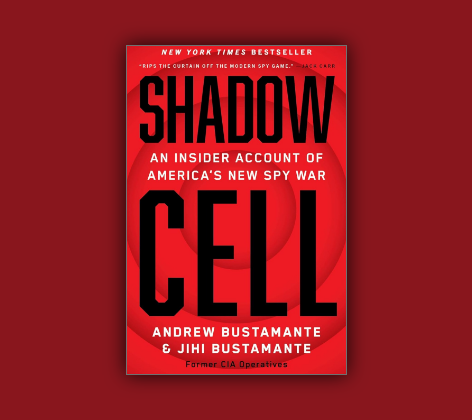Espionage, like leadership, is less about control and more about quietly shaping what others choose to do next.

I started following Andrew (Andy) Bustamante on TikTok, not because he was a former CIA covert operative, but because of his uncanny insight into how people think, perceive, and act. His calm, clinical breakdowns of real human behavior are striking in their simplicity and usefulness. Through both training and lived experience, Andy conveys a worldview shaped by trust, intuition, and the cold edge of consequence. In the world of espionage, it turns out, the most important traits aren’t aggression or dominance. Instead, they are adaptability, perceptiveness, and what he calls “forgettability”: the ability to be so nondescript and non-threatening that people forget you were ever there.
Shadow Cell, co-authored and narrated in alternating first-person chapters by Andy and his wife Jihi, is not the adrenaline-soaked spectacle we’ve come to expect from spy thrillers. Instead, it offers a candid, unvarnished portrayal of real-world espionage—slow, patient, and psychologically demanding. Missions unfold over weeks or months, not minutes. There are no car chases, rooftop shootouts, or Q Branch gadgets. What you get instead is a high-stakes psychological chess game where the objective is to influence human behavior without ever appearing to do so. The narrative pulls back the curtain on how operatives infiltrate networks, earn trust, and operate under intense pressure in hostile environments—all while maintaining the illusion of normalcy. That tension—of seeming ordinary while constantly navigating risk—is what makes the story both compelling and credible.
Where Shadow Cell connects most deeply with Inside the Decision is in the shared terrain of leadership under pressure. Adaptability and insightfulness, two of the core spy traits the Bustamantes emphasize, are also critical leadership competencies. Leaders don’t manipulate, but they do influence. They don’t deceive, but they do often operate within ambiguity. Just like intelligence operatives, effective leaders must learn to read people, spot patterns others miss, and shape decisions not through force, but through calibrated trust. What makes Shadow Cell unique is that it delivers these lessons not as abstractions, but as lived moments in which the wrong decision could have led to capture, exposure, or worse. As a leadership read, it’s a reminder that the most consequential decisions are often invisible to others, but deeply felt by those who carry them. For anyone navigating high-stakes environments—military, corporate, political, or personal—this book offers a gripping, grounded study in human influence under pressure.